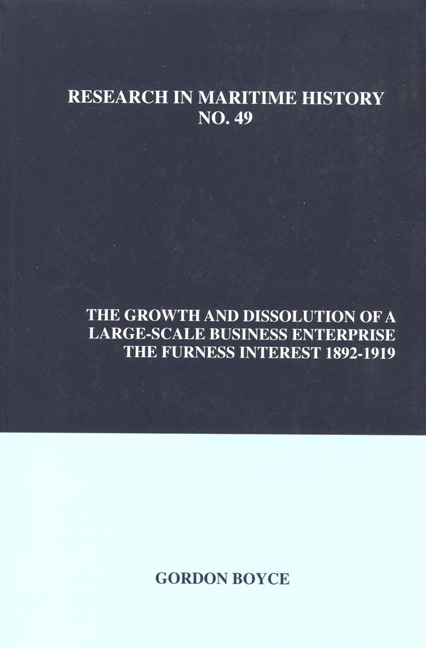Book contents
- Frontmatter
- Table of Contents
- About the Author
- Acknowledgements
- Figures and Tables
- Introduction
- Chapter 1 Furness' Shipping Services: Growth by Organic Means in the 1880s
- Chapter 2 The 1890s: Furness Withy's Expansion by Acquisition and Promotion
- Chapter 3 Diversification into the Industrial Sector, 1895-1901
- Chapter 4 Trouble on the Transatlantic Route: The Formation of the IMM and Furness' Response
- Chapter 5 The Growth of Shipping Services, 1902-1909
- Chapter 6 Industrial Operations and Performance, 1900-1914
- Chapter 7 The Growth of the Shipping Interests, 1910-1919
- Chapter 8 Structure
- Chapter 9 Finance
- Chapter 10 Holding Company Investment Activities and Intermediary Operations
- Chapter 11 Personnel
- Chapter 12 Furness
- Chapter 13 Dissolution
- Appendix 1 Development of the Combined Fleet, 1900-1919
- Appendix 2a Patterns of Ownership: The Furness Group, 1919
- Appendix 2b Reorganization of Branch Offices and Superintending Departments, 1911-1912
- Appendix 3a Fluctuations in Freights, Profits, Tonnage Afloat and Merchant Shipping Output
- Appendix 3b Output of Merchant Tonnage (Excluding Warships), 1892-1913
- Appendix 3c Fluctuations in the Price of a 7500-ton Cargo Steamer, 1898-1913
- Appendix 4 Development of the Furness Group: Principal Promotions, Acquisitions and Divestments, 1880-1919
- Appendix 5 Northern Allies and Maritime Associates
- Appendix 6 Contemporary Accounting Law and Conventions, 1845-1914
- Appendix 7 Lord Furness' Movements, 1899-1912
- Bibliography
Chapter 13 - Dissolution
- Frontmatter
- Table of Contents
- About the Author
- Acknowledgements
- Figures and Tables
- Introduction
- Chapter 1 Furness' Shipping Services: Growth by Organic Means in the 1880s
- Chapter 2 The 1890s: Furness Withy's Expansion by Acquisition and Promotion
- Chapter 3 Diversification into the Industrial Sector, 1895-1901
- Chapter 4 Trouble on the Transatlantic Route: The Formation of the IMM and Furness' Response
- Chapter 5 The Growth of Shipping Services, 1902-1909
- Chapter 6 Industrial Operations and Performance, 1900-1914
- Chapter 7 The Growth of the Shipping Interests, 1910-1919
- Chapter 8 Structure
- Chapter 9 Finance
- Chapter 10 Holding Company Investment Activities and Intermediary Operations
- Chapter 11 Personnel
- Chapter 12 Furness
- Chapter 13 Dissolution
- Appendix 1 Development of the Combined Fleet, 1900-1919
- Appendix 2a Patterns of Ownership: The Furness Group, 1919
- Appendix 2b Reorganization of Branch Offices and Superintending Departments, 1911-1912
- Appendix 3a Fluctuations in Freights, Profits, Tonnage Afloat and Merchant Shipping Output
- Appendix 3b Output of Merchant Tonnage (Excluding Warships), 1892-1913
- Appendix 3c Fluctuations in the Price of a 7500-ton Cargo Steamer, 1898-1913
- Appendix 4 Development of the Furness Group: Principal Promotions, Acquisitions and Divestments, 1880-1919
- Appendix 5 Northern Allies and Maritime Associates
- Appendix 6 Contemporary Accounting Law and Conventions, 1845-1914
- Appendix 7 Lord Furness' Movements, 1899-1912
- Bibliography
Summary
When Sir Christopher [sic] died, he left his vast business interests in the care of Sir John Furness [sic], a cousin [sic] of his, thinking that Duke could not or would not attend to them. He was to be proved very wrong. When Sir John [sic] died in an accident, in 1914, Duke took over complete control of all his father's enterprises… I wasn't surprised to learn that he was considered one of the most acute and brilliant businessmen in England. His word in the City was almost legal tender. I believe the sale of the Furness-Withy Line for some nine million pounds was concluded virtually on the back of a menu.
-Thelma, Lady FurnessMy mind is very full of the news Duke brought me on Monday, I was very surprised and it was a shock to me. Furness, Withy & Co. is very deere [sic] to me…and to know it has passed into other hands is difficult to realise [sic]. And I can not help wondering, if maybe enough thought has been given before this great step was taken. As I feel, if it was worth buying it, it was worth keeping, but I do not understand finance on this scale. I can only hope no mistake has been made and I trust that you, who had such high regard for the founder, think that the right step was taken.
-Jane, Dowager Lady FurnessDespite Lady Thelma's attempt to create myths, the sale of the family's interests in Furness Withy was certainly not concluded on the back of a menu. On the contrary, the intricate negotiations between Marmaduke, or Duke as the family called him, and Frederick W. Lewis took over one month to complete.
The personality of businessmen is considered to be an oft-overlooked factor that helps to explain decisions that may otherwise appear to be inconsistent with previous developments or with wider trends unfolding at a particular point in time. The break-up of the Furness Group in 1919 may seem rather unexpected, especially since the separation of its industrial holdings from the shipping business occurred at a time when other major enterprises exhibited a tendency to combine interests in the two sectors. Both directly and indirectly, the War had a profound effect on the Group; managerial changes and the rapid growth that took place during the conflict had distended internal lines of control.
- Type
- Chapter
- Information
- The Growth and Dissolution of a Large-Scale Business EnterpriseThe Furness Interest, 1892-1919, pp. 359 - 372Publisher: Liverpool University PressPrint publication year: 2012



